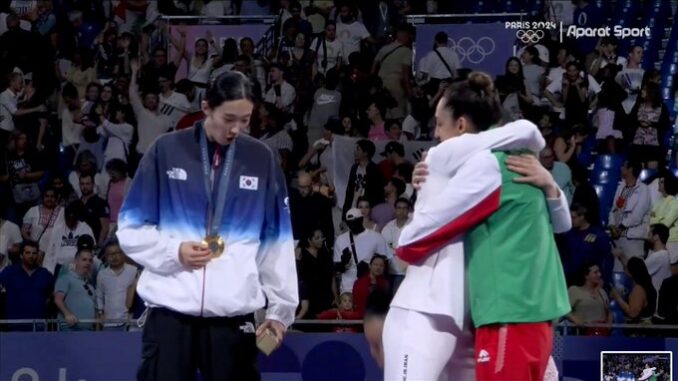
The Paris 2024 Olympics, anticipated as a global celebration of athletic excellence, is also becoming a stage for political battles, particularly for Iranian female athletes. The intersection of politics and sports has long been a contentious issue, but for Iranian women, this reality has never been more pronounced. As they prepare to compete on the world’s grandest sporting stage, these athletes find themselves caught in a complex web of political tensions, cultural expectations, and international scrutiny.
Iranian women have faced significant challenges in the realm of sports for decades. The Islamic Republic’s stringent laws and cultural norms have often limited their participation in various sports, especially on the international stage. Despite these obstacles, many female athletes have emerged as symbols of resilience, striving to compete and excel despite the restrictions placed upon them.
In recent years, the international community has increasingly highlighted the plight of these athletes, leading to growing pressure on Iran to allow greater freedom and representation for its female sports stars. The upcoming Paris Olympics have brought this issue into sharper focus, as the global stage will once again shine a spotlight on the struggles of Iranian women in sports.
For Iranian female athletes, the road to Paris is fraught with challenges that go beyond the physical demands of preparing for the Olympics. They are acutely aware that their presence in Paris carries political implications both at home and abroad. The Iranian government has often used sports as a tool of soft power, promoting athletes who align with its ideological stance while marginalizing those who do not. Female athletes, in particular, are expected to adhere to strict codes of conduct, including wearing the hijab and avoiding interactions that could be seen as contrary to Islamic values.
This burden of representation is heavy. For many athletes, it is not just about winning medals but also about navigating the complex expectations of their government, their society, and the international community. The political pressure is intense, with athletes often finding themselves at the center of controversies that they neither sought nor desired.
The international community has not been silent on the challenges faced by Iranian female athletes. Human rights organizations and advocacy groups have frequently called out the Iranian government for its restrictive policies, urging global sports bodies to ensure that these athletes can compete freely and without fear of reprisal.
In the lead-up to the Paris Olympics, there have been numerous campaigns aimed at raising awareness of the plight of these athletes. Social media has played a crucial role in amplifying their voices, with hashtags and viral posts bringing attention to their struggles. There is a growing movement to ensure that the Paris Olympics are not just about sports but also about standing up for the rights of all athletes, regardless of their nationality or gender.
For the athletes themselves, the Paris Olympics represent both an opportunity and a challenge. On one hand, they are eager to compete, to showcase their skills on the world stage, and to bring pride to their country. On the other hand, they are acutely aware of the political baggage that comes with their participation.
Many of these athletes have spoken out about the challenges they face, albeit often in veiled terms to avoid repercussions. They express a deep love for their sport and a desire to represent their country, but they also highlight the need for greater freedom and support. Their voices are a powerful reminder that sports should be about athletic achievement, not political maneuvering.
As the Paris 2024 Olympics draw closer, the world will be watching not just the athletic performances but also the broader context in which these games are taking place. For Iranian female athletes, the stakes are particularly high. Their journey to Paris is not just about competing for medals; it is about navigating a complex and often hostile environment where politics, culture, and sports collide.
In the end, these athletes embody the spirit of the Olympics perseverance, dedication, and the pursuit of excellence, even in the face of overwhelming odds. As they prepare to take their place on the global stage, they do so not just as athletes but as symbols of a broader struggle for freedom and equality.
Leave a Reply